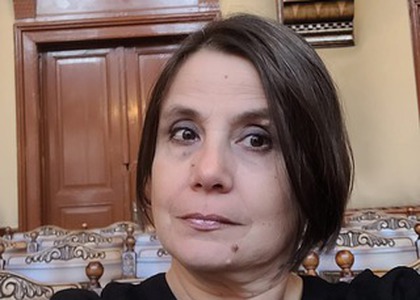> Interviews

Interview with composer Diana Dembinski Vodă
Saturday, April 5th, 2025, the National University of Music of Bucharest will be hosting the National ChoralWork Contest Gala, Coraliada. We can find out more details about how the 9th edition will unfold from composer and project manager Diana Dembinski-Vodă, in a dialogue with Ioana Țintea.
Mrs. Diana Dembinski Vodă, you are coordinating the National Choral Work Contest for young composers, which is reaching its 9th edition this year. From your perspective, how has Romanian choral work evolved in the past few years and how has this contest developed over the nine editions?
Choral work has had its ups and downs. We all know that it was supported in the period before the December Revolution and it developed, sometimes artificially, especially on certain topics, so there's no point talking about that right now. Those topics aside, there were, of course, certain peaks of choral work, including avant-garde. The great composers of the 60's, 70's, 80's, 90's, Anatol Vieru, Ștefan Niculescu, Myriam Marbe, Dan Buciu, composed representative pieces for this genre. After the Revolution there was a certain regression,which is why four figures, Irina Odăgescu Țuțuianu, Dan Buciu, Voicu Enăchescu and Petre Crăciun founded the National Choir Association of Romania. Through it, these contest-concerts started being organized in 1993, to support the choral works of young composers. We're only on the 9th edition because after the first six, various management issues started to appear and the pace slowed down. But the structure stayed the same. I'll tell you what happened from the 7th edition onwards, because that's when I took charge of organizing this event. The 7th, 8th and 9th editions went like this: we had a deadline for submitting the pieces, a selection took place and the pieces that would make it to the gala concert were chosen. There's around ten pieces.
What's new in this year's edition?
There's something that's not really better, compared to the last edition from two years ago. Back then we had three categories, namely children's choir, mixed choir and an educational category. Unfortunately the offer didn't meet our expectations and we had to let go of this category. This year's edition only has two categories, children's choir and mixed choir.
Like you said, Coraliada emphasizes two kinds of ensembles, children's choir and mixed choir, and the 10 pieces that will make it to the finals will be performed by two storied Romanian ensembles, the "Jean Lupu" Symbol Choir and the "Voicu Enăchescu" Preludiu Choir. For a young composer, how important is the opportunity to hear their work performed by such an ensemble?
It's crucial. It may be the most important thing, beyond the awards, which are diplomas and money- as much as we can afford. But the most important victory is, I think, and it seems they share my view because they know this, is the fact that this gala concert exists, an event where they can hear their pieces for the first time, performed masterfully.
What are the main technical and stylistic aspects that the jury takes into account to choose a winning choral score?
Given that we're talking about vocal music, the connection with the text is very important, by which I mean how much the text contributed to the creation of said piece. Then, of course, the clarity of the structure, how fitting the writing is for the ensemble, whether certain characteristics of the text are properly emphasized through, let's say, climaxes, types of language, harmonic, melodious, syntactic. Generally, these would be the criteria we're taking into account.
Is there any stylistic direction you've noticed in the pieces that made it to the finals of this edition?
No. There's variety, both stylistically and in the contestants' educational backgrounds. Most of them are students or alumni of the composition department, but there are a few participants from other departments, such as orchestral conducting or music pedagogy.
Please tell us about the program of this year's gala concert.
In the first half we'll be listening to the pieces composed for children's choir, with the "Jean Lupu" Symbol Choir being conducted by the wonderful and choir-loving Luminița Guțanu. The four pieces that will be performed are by contestants Toma Verly, Maria Perianu Alexandru, Ana Creangă and Mihnea Stroe. In the second half we'll hear the "Voicu Enăchescu" Preludiu Choir. There's a surprise here. As we all know, it's conducted by Andrei Stănculescu, but he has two younger collaborators in the ensemble who will each be conducting two pieces. The pieces in the second half are by contestants Andrei Miron, Gabriel Șandru, Anda Ștefania Baciu, Oana Vardianu, Toma Verly, again, he's the only one who submitted pieces to both categories, and Mihnea Dușcă. The entry is free.We'll be at the National University of Music of Bucharest, in the George Enescu hall, which is a fairly big hall. We hope as many people as possible will attend, people who support the idea itself, as well as choral music and new music.
Translated by Teodora Ciolacu,
University of Bucharest, Faculty of Foreign Languages and Literatures, MTTLC, year I
Corrected by Silvia Petrescu














